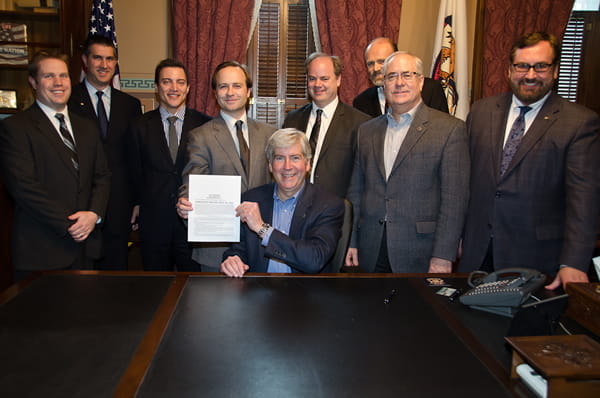The web Browser you are currently using is unsupported, and some features of this site may not work as intended. Please update to a modern browser such as Chrome, Firefox or Edge to experience all features Michigan.gov has to offer.
Snyder signs new business, community revitalization programs into law
December 13, 2011
Sara Wurfel
517-335-6397 or wurfels@michigan.gov
MEDC: Michael Shore
517-335-4590 or shorem2@michigan.org
FOR IMMEDIATE RELEASE
Tuesday, Dec. 13, 2011
LANSING, Mich. - Gov. Rick Snyder today signed into law a five-bill package creating new economic development and community revitalization programs that will provide $100 million in incentives for highly competitive projects in Michigan.
The Michigan Business Development and Michigan Community Revitalization Programs replace the state's previous MEGA, Brownfield and Historic tax credit programs that were features of the Michigan Business Tax and were eliminated under business tax restructuring legislation approved and signed into law by the governor in May.
"We have worked diligently to build a friendlier business climate in Michigan to help drive Michigan's economic turnaround," Snyder said. "These programs will better leverage our state's assets in ways that are simple, fair, efficient and transparent."
"These new incentive programs enable us to attract business investment for job creation and redevelopment of our communities with performance based benchmarks through a transparent process," said MEDC President and CEO Michael A. Finney. "We can now offer quicker access to funding assistance for businesses and developers with lower costs and greater flexibility for the state and our communities."
Senate Bill 556, sponsored by state Sen. John Proos, creates the Michigan Business Development Program to provide grants, loans and other economic assistance to qualified businesses that make investments or create jobs in Michigan, with preference given to businesses that need additional assistance for deal-closing and for second stage gap financing. The bill is now Public Act 250 of 2011.
In any fiscal year, a qualified business cannot receive more than $10 million. The legislation amends the Michigan Strategic Fund (MSF) Act and places the new program within the MSF. The program effectively replaces the MEGA tax credit program.
The MSF will consider a number of factors in making these awards, including: out-of-state competition, private investment in the project, business diversification opportunities, near-term job creation, wage and benefit levels of the new jobs and net-positive return to the state. Business retention and retail projects are not eligible for consideration of these incentives.
Senate Bills 566-568 and 644, sponsored by state senators John Pappageorge, Mike Kowall, Geoffrey Hansen and Tonya Schuitmaker respectively, create a new Michigan Community Revitalization Program. This program will provide grants, loans or other economic assistance of up to $10 million to projects that will revitalize regional urban areas, act as a catalyst for additional investment in a community, reuse vacant or historic buildings and promote mixed use and sustainable development. The Michigan Community Revitalization Program is created within the MSF. These bills are now Public Acts 250-254 of 2011.
"Michigan's communities are doing all we can with properties and buildings that have become neglected and are in a state of deterioration. The signing of these bills today will help our communities to continue to address these obsolete and blighted eyesores," said Hamtramck Mayor Karen Majewski, president of the Michigan Municipal League Board of Trustees.

#####